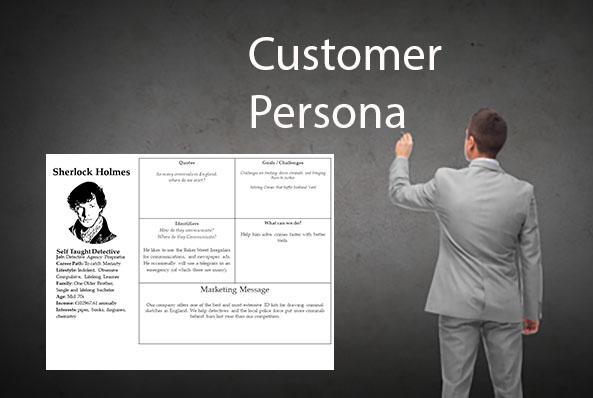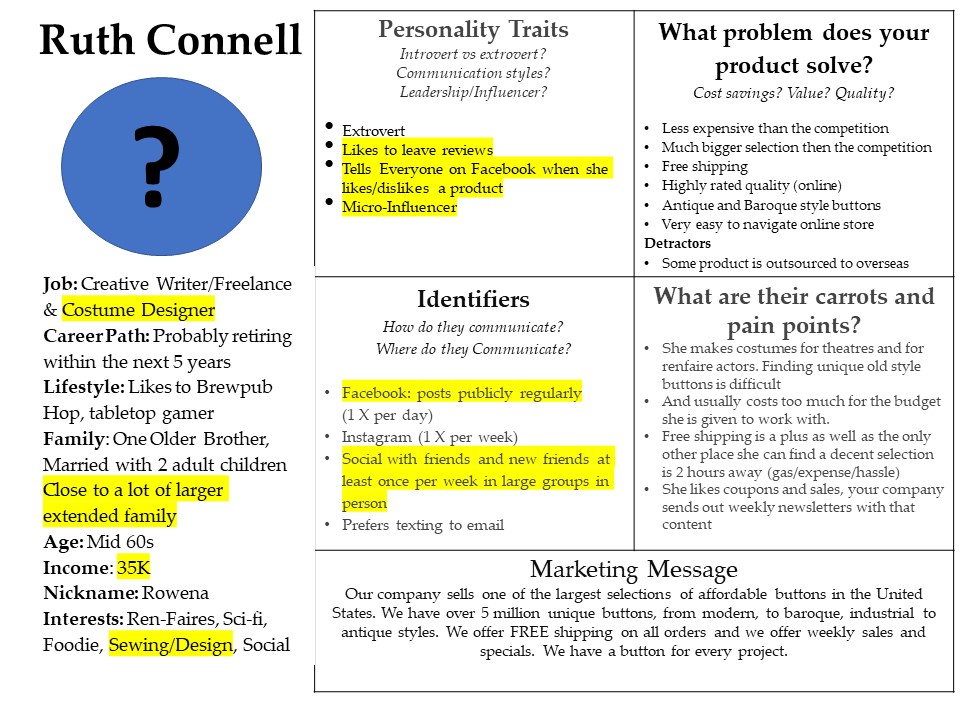 Last week I ran an online workshop about how to create a customer persona. As part of the workshop, I touched on how businesses can use the power of social media to data mine social media profiles for information, and I wanted to elaborate on it a bit.
Last week I ran an online workshop about how to create a customer persona. As part of the workshop, I touched on how businesses can use the power of social media to data mine social media profiles for information, and I wanted to elaborate on it a bit.
The internet is a very scary place, and I don’t think people truly realize how much information is out there for public view.
A perfect example of this is every year when we lived in CT;
I used to run a class for the Middlesex Library, which had a jobseekers program, Social Media for Jobseekers.
Every year I would talk about how with a bit of Googling, how much information was out there online for HR, for companies, and for recruiters to be able to see without even digging that hard or violating any privacy.
In every group, I’d get at least one skeptic: “You can’t find anything out about me; I’m not on any social media channels!!!!”. And I would have them give me their name, the town they were from, and nothing else. I’d say, “Give me a minute on Google, please.”
So “Bill,” you are a long-time member of Rotary, you went to UCONN and studied meat science, you like fly fishing, and you are extremely unhappy with the customer service at XYZ brand. You love to order dog toys from Chewy, and you coach your middle school daughter’s soccer team. That’s only page one. Would you like me to continue?”
Now put that information into a persona (that’s not even including social media data mining), and that’s not even digging very hard.
- Rotary Member (likes to give back to community and volunteer)
- UCONN graduate (large college with an extensive alumni network)
- Meat Science Degree (probably currently works or formerly in the food business, probably wholesale)
- Likes flyfishing (outdoors person, likes to spend time alone (supposition)-passionate about it as found multiple flyfishing forums he belongs to
- Shops at XYZ brand quite a bit.
- Does not like bad customer service (15 bad reviews about it, 40 good reviews about positive customer service experiences)
- Has a dog or dogs
- Has at least one child (A daughter who likes to play soccer)
- He probably purchases soccer apparel for his daughter, who is in middle school and does not have the funds to purchase them herself.
Now how much more can you dig out just going past page one?
Now, let’s see what we can dig out on Social Media. A goldmine, actually many gold mines on top of the one Google gives you. Facebook is a wealth of information, and sadly (but good for businesses), not everyone has their profiles completely locked down.
I’m going to use a friend as an example; I looked at her account through the account of someone she is not friends with to see what information is public to someone logged into Facebook.
I can (publicly/logged into FB but not friends with her in this case) see that she is a creative writer, a former reporter at a local paper, she studied communications at XYZ university, she studied “partying” at another university, she went to ZYX High School, she’s married, and she currently is a costume theater designer and likes renaissance fairs (including making costumes for ren faires).
She also has some posts not set to “friends” only; she likes brewpub hopping with her husband and a large pool of friends. And she’s a board game addict.
She is from New Jersey, currently lives in Pennsylvania (Town specific), and moved there about 30 years ago.
She is also on Instagram (Insta handle provided), and she posts daily on Facebook, only about once a week on Instagram. (so Facebook would be a good target for her, but probably not Instagram. I have no idea if she is on Linkedin or Twitter (because I haven’t looked yet).
She identifies as female, a Gemini, her religious views are Buddhist, and her political stance is Progressive. She frequently shares her husband’s political posts, who is clearly not a republican or a fan of a past president.
I can also see where she’s checked in on Facebook: breweries, bookstores, national parks, cosplay conventions, ren faires, theaters, Indian restaurants, etc.
I can see what kind of movies and TV shows she has indicated she likes, as well as books and a whole lot more information.
I used a fictitious button company (The Button Store, over 5 Million Buttons!) as the business that would be building a persona based on my friend.

A real persona, if you were going to do one for a company, would include a lot more research on people and a lot more data mining of other profiles, but I wanted to use this as an easy example.
Let’s move on to the other social channels: Linkedin also has a lot of information, not just in people’s bios, but what groups they belong to, what interests they have, their backgrounds, who they are connected to, and what they post about.
Instagram and Twitter (I’m not going to include TikTok because of the primarily younger audience, and I wouldn’t UNLESS that was your target market) don’t have as much information at first glance to glean.
But you can tell who they are following, who is following them, generally if they have other social accounts, where they live, how often they post, what they post about, and in Twitter’s case, what they repost and who they converse with, etc. You can find some of that on Instagram, but it doesn’t have the native reposting option that Twitter does.
While this may seem a bit creepy, big companies do this all the time, and it doesn’t stop a small business from using the same data mining techniques. It’s just time-consuming, you are looking for information that is already public.
For small businesses and anyone who uses social media media, I would VERY much encourage people to look at what they post and the specifics of what people can see. Google yourself, too; it’s always eye-opening.
I’m not going to go on a rant about locking down everything again (done that enough in the past) ,but please be cognizant of what’s out there.
From a small business perspective, if you want to make accurate customer personas, set aside 5 or 10 minutes a day, do some Googling, check out some social profiles, and compile information. Please don’t do a generic persona, do as many as you need for your business and customize them to suit.
Hubspot has some great resources I suggest you check out if you are just starting to create personas for your business. When doing your research, don’t forget to check out people’s reviews on Google, Facebook, Yelp, and Tripadvisor, as well as any other review sources you can find. You can glean a lot about someone from their reviews.
HubSpot Resources
https://offers.hubspot.com/persona-templates
https://www.hubspot.com/make-my-persona
https://blog.hubspot.com/marketing/buyer-persona-research
(How to Find Interviewees for Researching Buyer Personas section And 20 Questions to Ask in Persona Interviews are particularly helpful)
Some additional articles you may find useful
https://www.semrush.com/blog/buyer-persona-examples-beyond-basics/
https://buffer.com/library/marketing-personas-beginners-guide/
https://blog.hootsuite.com/buyer-persona/
To use the example of “Bill” in the beginning of the post, good customer service is a sticky point for him. If you were going to use him and say 15-20 other people to create a detailed persona, what could you put in your persona to elaborate on that? And how would that make your company stand apart from the competition? Is this a person/persona that would pay more for terrific customer service? Travel further for it? Prefer to use email or phone rather than shop online for it? What can you glean from what people are telling you? Use Google and the Social Platforms out there to create your personas, don’t just make them up based on what you think should go in there.
